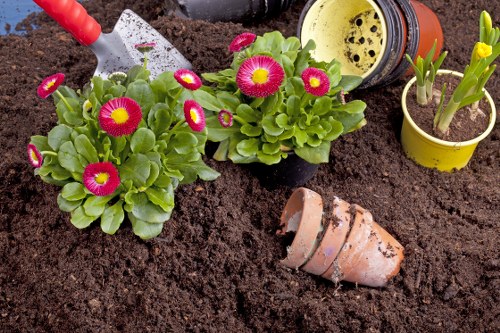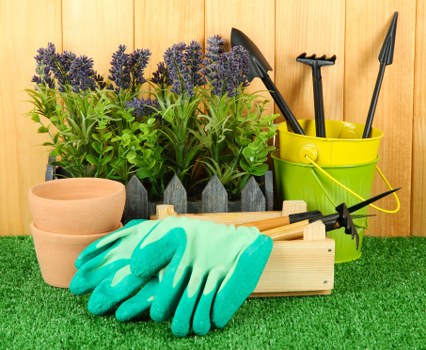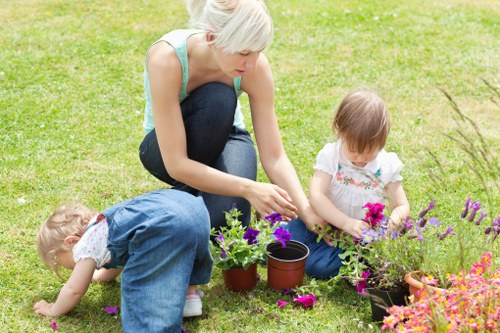Garden Maintenance in Daceyville

Essential Garden Maintenance Tips for Daceyville
Maintaining a beautiful garden in Daceyville requires a combination of dedication, knowledge, and the right techniques. Whether you're a seasoned gardener or a beginner, these tips will help you achieve a vibrant and healthy garden all year round.
First and foremost, understanding the specific climate and soil conditions of Daceyville is crucial. The region experiences a temperate climate with moderate rainfall, making it ideal for a wide variety of plants. However, it's essential to select plant species that are well-suited to these conditions to minimize maintenance efforts and ensure thriving growth.
Regular watering is another key aspect of garden maintenance. Daceyville's climate allows for a balance between natural rainfall and the need for supplementary watering. Implementing an efficient irrigation system can help maintain optimal soil moisture levels, especially during the drier months.

Seasonal Garden Care in Daceyville
Spring Maintenance
Spring is a time of rejuvenation for gardens in Daceyville. Begin by clearing away any debris that accumulated over the winter months. This includes removing dead leaves, branches, and any other litter that can hinder plant growth.
Pruning is also essential during spring. By trimming back overgrown branches and stems, you encourage healthier growth and prevent diseases. Make sure to use sharp, clean tools to avoid damaging the plants.
Additionally, this is the perfect time to plant new flowers and vegetables. Prepare the soil by adding compost or other organic matter to enrich it, providing a fertile environment for new growth.

Summer Maintenance
Summer brings the challenge of maintaining moisture levels in your garden. Regular watering is crucial, but it's equally important to avoid overwatering, which can lead to root rot and other issues.
Mulching is an effective way to retain soil moisture and regulate temperature. Apply a layer of organic mulch around your plants to help conserve water and suppress weeds.
Monitoring for pests becomes more important in the summer months. Keep an eye out for common garden pests and address any infestations promptly using eco-friendly treatments to protect your plants.

Autumn Maintenance
As the weather begins to cool, it's time to prepare your garden for the winter. Start by clearing out spent plants and adding compost to replenish the soil.
Protect your plants by covering them with burlap or other protective materials. This helps shield them from frost and harsh winter winds.
Finally, consider planting winter-blooming species to ensure your garden remains attractive even during the colder months.

Winter Maintenance
Winter maintenance focuses on protecting your garden from the harsh elements. Ensure that all garden tools are cleaned and stored properly to prevent rust and corrosion.
Inspect your garden structures, such as sheds and greenhouses, to ensure they are secure and in good condition for the upcoming year.
Take this time to plan for the next gardening season. Research new plant varieties and design ideas to enhance your garden's beauty and functionality.
Choosing the Right Plants for Daceyville Gardens
Selecting the appropriate plants is fundamental to successful garden maintenance. Native plants are an excellent choice as they are well-adapted to the local climate and soil conditions, reducing the need for excessive watering and fertilizers.
Consider incorporating a mix of perennials and annuals to ensure continuous blooms throughout the seasons. Perennials provide long-term structure, while annuals offer vibrant color and variety each year.
- Roses: A classic choice that offers a variety of colors and fragrances.
- Lavender: Known for its soothing scent and resilience.
- Hostas: Perfect for shaded areas, providing lush foliage.
- Hydrangeas: Offer large, beautiful blooms that can transform the garden.
- Marigolds: Brighten up the garden with their vibrant colors and help deter pests.
Soil Health and Fertilization
Healthy soil is the foundation of a thriving garden. Regularly testing your soil can help you understand its composition and identify any deficiencies.
Incorporate organic matter, such as compost or well-rotted manure, to improve soil structure, enhance nutrient content, and promote beneficial microbial activity.
Fertilization should be tailored to the specific needs of your plants. Use a balanced fertilizer to provide essential nutrients, and avoid over-fertilizing, which can lead to excessive growth and vulnerability to pests.
Weed Control Strategies
Weeds compete with your garden plants for nutrients, water, and sunlight. Implementing effective weed control strategies is essential for maintaining a healthy garden.
- Mulching: Apply a layer of mulch to suppress weed growth and retain soil moisture.
- Hand Weeding: Regularly remove weeds by hand to prevent them from spreading.
- Herbicides: Use eco-friendly herbicides as a last resort, ensuring they do not harm your desirable plants.
- Proper Plant Spacing: Planting densely can reduce the chances of weeds taking hold.
Pruning and Trimming
Regular pruning and trimming help maintain the shape and health of your plants. It encourages robust growth and prevents diseases by removing dead or diseased branches.
Use appropriate pruning techniques for different plant species. For example, roses benefit from a strong annual prune in the spring, while fruit trees may require lighter trimming throughout the year.
Pruning should be done with clean, sharp tools to make precise cuts and minimize damage to the plants.
Irrigation Systems and Water Conservation
Efficient irrigation is vital for garden maintenance in Daceyville. Installing a drip irrigation system can deliver water directly to the plant roots, reducing water waste and ensuring consistent moisture levels.
Consider using rain barrels or other water harvesting methods to collect and store rainwater. This not only conserves water but also provides a sustainable source of irrigation for your garden.
Implementing smart irrigation controllers can automate watering schedules based on weather conditions, further enhancing water conservation efforts.
Pest and Disease Management
Protecting your garden from pests and diseases is essential for maintaining plant health. Regular monitoring allows you to identify and address issues early.
Encourage natural predators, such as ladybugs and birds, to inhabit your garden. These beneficial creatures help control pest populations without the need for chemical interventions.
When dealing with plant diseases, remove and dispose of affected plant parts to prevent the spread of the disease. Using disease-resistant plant varieties can also reduce the risk of infection.
Garden Tools and Equipment
Having the right tools is essential for efficient garden maintenance. Invest in high-quality tools that are comfortable and durable to make your gardening tasks easier.
Regularly clean and maintain your tools to extend their lifespan and ensure they perform optimally. This includes sharpening blades, oiling moving parts, and storing tools properly.
Consider ergonomic tools to reduce strain and prevent injury during prolonged gardening activities.
Composting and Waste Management
Composting is an excellent way to recycle organic waste and create nutrient-rich soil for your garden. Collect kitchen scraps, yard waste, and other organic materials to build a healthy compost pile.
Maintain a balance of green (nitrogen-rich) and brown (carbon-rich) materials to facilitate effective decomposition. Regularly turning the compost pile helps aerate it and speed up the process.
Using compost in your garden improves soil structure, enhances nutrient content, and promotes beneficial microbial activity, leading to healthier plants.
Mulching Techniques
Mulching offers numerous benefits, including moisture retention, soil temperature regulation, and weed suppression. Apply a layer of organic mulch around your plants to provide these advantages.
Choose the right type of mulch based on your garden needs. Common options include wood chips, straw, shredded leaves, and compost.
Ensure that mulch is applied evenly and kept a few inches away from plant stems to prevent moisture-related issues and promote healthy growth.
Garden Design and Layout
A well-designed garden not only looks beautiful but also functions efficiently. Plan your garden layout by considering factors such as sunlight exposure, soil type, and plant spacing.
Incorporate a mix of plant heights, textures, and colors to create visual interest and depth in your garden.
Pathways, borders, and garden structures like pergolas or arbors can add structure and functionality, making maintenance tasks easier and enhancing the overall appeal of your garden.
Local Gardening Resources and Community
Engaging with local gardening communities and resources can provide valuable support and inspiration. Daceyville offers various workshops, gardening clubs, and online forums where you can connect with fellow gardeners.
Attending local events and visiting community gardens can offer hands-on experience and the opportunity to learn new techniques and plant varieties suited to the area.
Utilize local nurseries and garden centers for advice on plant selection, soil amendments, and pest management tailored to Daceyville's specific conditions.
Nearby Areas to Daceyville for Garden Maintenance Services
Expanding your garden maintenance services beyond Daceyville allows homeowners in neighboring areas to benefit from professional expertise. Here are some of the closest areas:
- Arrawarra: Located just north of Daceyville, Arrawarra boasts lush gardens and offers a similar temperate climate ideal for diverse plant species.
- Dayboro: A short distance to the west, Dayboro is known for its community gardens and active gardening groups, making it a prime area for maintenance services.
- Eastwood: Situated to the east, Eastwood has a mix of residential and commercial gardens, requiring comprehensive maintenance solutions.
- Tura Beach: To the south, Tura Beach features coastal gardens that benefit from specialized maintenance practices to withstand salty air and sandy soils.
- Narrabeen: Further north, Narrabeen's seaside gardens offer unique challenges and opportunities for garden maintenance professionals.
- Frenchs Forest: Known for its large properties and extensive gardens, Frenchs Forest is an excellent area for premium garden maintenance services.
- Dee Why: Hosting a variety of gardens from small urban spaces to large estates, Dee Why requires flexible and tailored maintenance approaches.
- Belrose: With its quiet neighborhoods and well-maintained gardens, Belrose residents seek reliable maintenance services to preserve their green spaces.
- Brookvale: Offering a blend of modern and traditional gardens, Brookvale is a bustling area that benefits from scheduled and on-demand maintenance services.
- Sylvie: A bit further out, Sylvie's community-focused gardens are ideal for sustainable and eco-friendly maintenance practices.
- Longyouth: Featuring diverse garden styles, Longyouth requires versatile maintenance services to cater to different plant and design needs.
- Kangaroo Point: Known for its scenic gardens and parklands, Kangaroo Point attracts garden enthusiasts who appreciate professional care and expertise.
- Manly Vale: With its rich botanical diversity, Manly Vale presents opportunities for specialized garden maintenance services focusing on native and exotic plants.
- Freshwater: Combining urban living with garden spaces, Freshwater residents look for efficient and effective maintenance solutions to keep their gardens thriving.
- Beacon Hill: Featuring hilly terrains and varied plant life, Beacon Hill requires experienced maintenance professionals adept at handling complex garden layouts.
Environmental Sustainability in Garden Maintenance
Adopting sustainable practices in garden maintenance not only benefits the environment but also enhances the health and longevity of your garden.
Use organic fertilizers and pesticides to minimize chemical usage and protect local wildlife. Composting garden waste reduces landfill contributions and enriches the soil naturally.
Implementing water-efficient irrigation systems and rainwater harvesting can significantly reduce water consumption, making your garden more resilient to drought conditions.
Hiring Professional Garden Maintenance Services
While DIY garden maintenance is rewarding, hiring professional services can save time and ensure optimal results. Experienced gardeners bring expertise in plant care, soil management, and pest control tailored to Daceyville's unique environment.
Professional services often offer comprehensive maintenance packages, including seasonal upkeep, design enhancements, and emergency care, ensuring your garden remains in pristine condition throughout the year.
When selecting a garden maintenance service, consider factors such as experience, customer reviews, and the range of services offered to find a provider that best meets your garden's needs.
DIY Garden Maintenance Tips
For those who prefer to maintain their gardens independently, here are some DIY tips to keep your garden flourishing:
- Regular Monitoring: Keep a close eye on plant health, soil moisture, and pest activity to address issues promptly.
- Proper Tool Maintenance: Keep your gardening tools clean and in good condition to make maintenance tasks easier and more efficient.
- Efficient Scheduling: Create a maintenance schedule that outlines daily, weekly, and monthly tasks to stay organized and ensure nothing is overlooked.
- Continuous Learning: Stay informed about the latest gardening techniques and trends to continually improve your garden's health and appearance.
- Seed Saving: Save seeds from healthy plants to promote sustainability and reduce gardening costs.
Integrating Technology in Garden Maintenance
Embracing technology can streamline garden maintenance tasks and enhance efficiency.
Smart irrigation systems allow for automated watering based on real-time weather data, ensuring optimal moisture levels without manual intervention.
Garden management apps can help track plant health, schedule maintenance tasks, and even identify pests and diseases through image recognition features.
Creating a Wildlife-Friendly Garden
Designing your garden to attract and support local wildlife adds vibrancy and contributes to environmental sustainability.
Planting native species provides food and habitat for birds, butterflies, and beneficial insects. Incorporate features like birdhouses, bat boxes, and insect hotels to encourage biodiversity.
Avoid using pesticides and herbicides that can harm wildlife, focusing instead on natural pest control methods to maintain a balanced ecosystem.
Lighting and Garden Aesthetics
Proper lighting enhances the beauty and functionality of your garden, allowing you to enjoy it even after sunset.
Use a combination of ambient, task, and accent lighting to highlight key features such as pathways, sculptures, and water features. Solar-powered lights are an eco-friendly option that reduces energy consumption.
Incorporate garden art and decorative elements to add personality and charm to your outdoor space, making it a welcoming environment for both you and your guests.
Maintaining Garden Structures
Garden structures like sheds, pergolas, and fences require regular maintenance to ensure their durability and appearance.
Inspect structures for any signs of damage or wear, repairing or replacing components as needed to maintain safety and functionality.
Clean and treat wooden structures to prevent rot and decay, and apply protective coatings to metal and plastic components to extend their lifespan.
Budget-Friendly Garden Maintenance
Maintaining a beautiful garden doesn't have to be expensive. Implementing budget-friendly strategies can help you manage costs without compromising quality.
Opt for native plants that require less water and maintenance, reducing ongoing expenses. Utilize DIY projects and recycled materials to create garden structures and decorations.
Plan your garden layout thoughtfully to maximize space and resources, ensuring efficient use of materials and minimizing waste.
Health Benefits of Garden Maintenance
Engaging in garden maintenance offers numerous health benefits, both physical and mental. Gardening activities like digging, planting, and weeding provide a good workout, improving strength and flexibility.
Spending time outdoors and connecting with nature can reduce stress, enhance mood, and promote overall well-being. A well-maintained garden serves as a serene retreat, offering a space for relaxation and rejuvenation.
Additionally, growing your own vegetables and herbs contributes to a healthy diet, providing fresh, organic produce for your meals.
Planning for Future Garden Growth
Successful garden maintenance involves foresight and planning for future growth. Regularly assess the progress of your plants and make adjustments to accommodate their growth patterns.
Consider incorporating perennial plants that will return each year, providing a stable foundation for your garden's design. Plan for expansion by leaving space for new plantings and garden features.
Stay updated on new gardening trends and innovations to keep your garden evolving and thriving.
Conclusion
Effective garden maintenance in Daceyville requires a blend of knowledge, planning, and regular care. By following these tips and adapting to the local climate and soil conditions, you can create and maintain a beautiful, sustainable garden that enhances your outdoor living space.
Whether you choose to handle maintenance yourself or hire professional services, investing time and effort into your garden will yield rewarding results in the form of vibrant blooms, healthy plants, and a peaceful retreat right at your doorstep.
Contact us today to schedule your garden maintenance service and transform your Daceyville garden into a stunning oasis.
